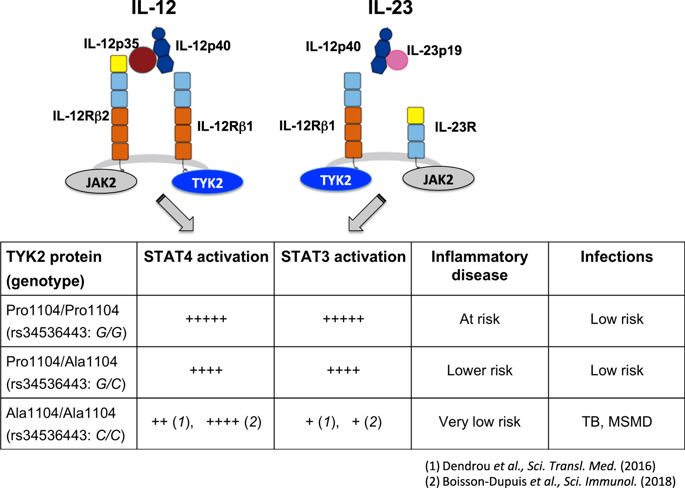Genes and Immunity ( IF 5.0 ) Pub Date : 2019-04-19 , DOI: 10.1038/s41435-019-0067-y Elisabetta Bianchi 1, 2 , Lars Rogge 1, 2

|
Chronic inflammatory diseases such as rheumatoid arthritis, inflammatory bowel disease, spondyloarthritis, and psoriasis cause significant morbidity and are a considerable burden for the patients in terms of pain, impaired function, and diminished quality of life, as well as for society, because of the associated high health-care costs and loss of productivity. Our limited understanding of the pathogenic mechanisms involved in these diseases currently hinders early diagnosis and the development of more specific and effective therapies. The past years have been marked by considerable progress in our insight of the genetic basis of many diseases. In particular, genome-wide association studies (GWAS) performed with thousands of patients have provided detailed information about the genetic variants associated with a large number of chronic inflammatory diseases. These studies have brought to the forefront many genes linked to signaling pathways that were not previously known to be involved in pathogenesis, pointing to new directions in the study of disease mechanisms. GWAS also provided fundamental evidence for a key role of the immune system in the pathogenesis of these diseases, because many of the identified loci map to genes involved in different immune processes. However, the mechanisms by which disease-associated genetic variants act on disease development and the targeted cell populations remain poorly understood. The challenge of the post-GWAS era is to understand how these variants affect pathogenesis, to allow translation of genetic data into better diagnostics and innovative treatment strategies. Here, we review recent results that document the importance of the IL-23/IL-17 pathway for the pathogenesis of several chronic inflammatory diseases and summarize data that demonstrate how therapeutic targeting of this pathway can benefit affected patients.
中文翻译:

人类慢性炎性疾病中的IL-23 / IL-17途径-遗传学和靶向疗法的新见解
类风湿关节炎,炎性肠病,脊椎关节炎和牛皮癣等慢性炎症性疾病会导致严重的发病率,并且由于疼痛,功能受损,生活质量下降以及社会的负担,给患者和社会带来沉重负担。随之而来的高昂的医疗费用和生产力的损失。我们对与这些疾病有关的致病机理的了解有限,目前阻碍了早期诊断和更具体有效的治疗方法的发展。在过去的几年中,我们对许多疾病的遗传基础有了深刻的了解。特别是,对成千上万的患者进行的全基因组关联研究(GWAS)提供了与大量慢性炎性疾病相关的遗传变异的详细信息。这些研究已将许多与信号传导途径相关的基因带到了最前沿,这些基因以前尚不参与发病机制,为疾病机理的研究指明了新的方向。GWAS还为免疫系统在这些疾病的发病机理中的关键作用提供了基础证据,因为许多已确定的基因座都映射到涉及不同免疫过程的基因。但是,与疾病相关的遗传变异对疾病发展起作用的机制和靶向细胞群的了解仍然很少。GWAS后时代的挑战是了解这些变体如何影响发病机理,以将遗传数据转化为更好的诊断方法和创新的治疗策略。在这里,我们回顾了最近的结果,这些结果记录了IL-23 / IL-17途径对于几种慢性炎症性疾病的发病机理的重要性,并总结了表明该途径的治疗靶点如何能够使受影响的患者受益的数据。











































 京公网安备 11010802027423号
京公网安备 11010802027423号